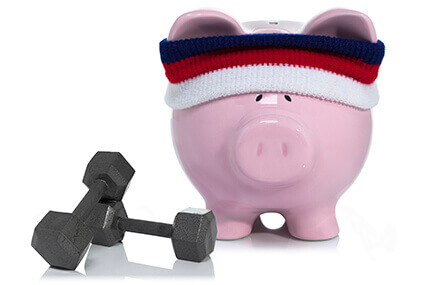Pay Off Debt
Whether it's holiday credit card bills rolling in or student debt that's piling up, you can take control of your debt load this year.If it's feasible, you should always pay more than the minimum amount you owe on your credit card bill. Lowering your balance means you'll pay less in interest down the road. If you don't feel like you can pay more than the minimum, consider downsizing your spending, even if temporarily. You can also consider refinancing things like your car loan in order to have a more affordable payment.
RELATED: Looking to finance or refinance a car? Consider a UHCU Auto Loan.
It can also be helpful to focus on one debt at a time. One strategy is to pay off the card with the smallest balance first so you have fewer credit card payments to make each month. Another – which can potentially be the most cost-effective – is to pay off the credit card with the highest interest rate first.
Build Your Savings
It can be hard to set aside money and start saving – especially if you're living paycheck-to-paycheck or have a lot of expenses – but the last thing you want is to end up with an unexpected expense you can't pay.Suggestions for how much you should have in your rainy day fund vary widely, but most financial experts agree on a minimum of $1,000. Start small if you have to – even if you're saving only one or two percent of your paycheck, anything is better than nothing. Plus, once your savings are built up, it’ll be easier to do things like purchase a home since you won't be so strained financially.
RELATED: Buying a house? Check out UHCU Mortgage Loans.
You should also be saving for your future. If you're already contributing to a retirement account, consider increasing your contributions until you're saving about 10 percent of your salary. If you're not saving for retirement, now's a great time to start. Check out your employer's 401k plan; many companies even offer matching benefits. If your employer doesn't have a 401k program or you want to diversify your retirement savings, look into setting up an IRA with UHCU.
Create a Budget
Your debt is shrinking and your savings are growing. Now is a great time to create a budget. The first step is to figure out your current financial status.Track your spending for a month or so – you can do this manually or with the help of an app. Then, review your expenditures. Sort your spending by category (food, entertainment, medical, etc.). Analyze your findings and ask yourself questions like: Am I spending more than I make? Am I saving as much as I should? Do I spend too much in a certain category? Are there ways to decrease my spending in certain categories to save more or budget for other categories?
Now create a spending plan. Add up all your income (paychecks, tax refunds, dividends and more) and compare it to your spending. If you spend more than you make, it's time to cut back.
Once you understand your financial patterns, set a goal. Do you want to reduce the amount of money you spend at restaurants? Save more for a specific life milestone? Pay more toward the principle of your loans? Whatever it is, have something to work for, make adjustments as necessary and enjoy knowing that you're well on your way to financial freedom.
Check out this blog post on keeping your financial resolutions in the New Year.

